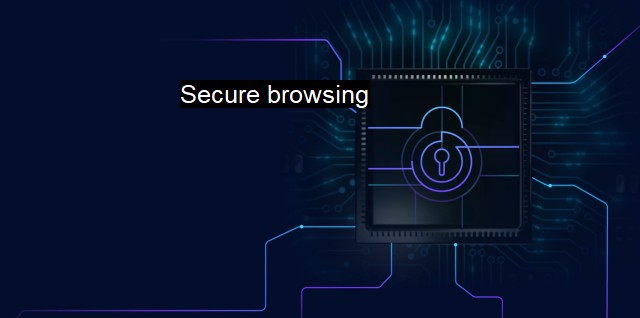What is Secure browsing?
The Importance of Secure Browsing in Cybersecurity: Protect Yourself from Online Threats, Malware, and Hacking Attacks
Secure browsing is an integral concept and practical necessity within the broader field of cybersecurity and antivirus strategies. It essentially refers to the experience of surfing the Internet while your personal data, browsing history, and overall digital life are being safeguarded from potential threats, including hackers, viruses, spying eyes, and malware.To understand the importance of secure browsing, it's essential to recognize that your online activities aren't entirely private. Without proper security measures in place, individuals, companies, or algorithms can easily gain insight into what you're doing online, whether it's the articles you're reading, what you're shopping for, or even the private messages you send. Privacy invasion is not simply about someone watching what you are doing online, it's about the implications and potential misuse of that information.
Further worsening the situation, cyber threats are commonplace and can result in loss of personal and financial information through online data breaches. Phishing attacks, in which scam emails masquerade as reputable companies to lure unsuspecting users into revealing sensitive information, viruses that can hamper or completely dismantle computer systems, spyware that feeds off of personal information without consent - all this and more are included within the wide range of issues secure browsing seeks to counteract.
In a more technical sense, secure browsing typically involves the use of security protocols that encrypt the data being transmitted. A well-known protocol is HTTPs, the secure version of HTTP (Hypertext Transfer Protocol). When using an HTTPs site, the data exchanged is encrypted, making it far more difficult for an unauthorized party to intercept or view the data exchange.
Anti-virus software and firewalls are also critical components for secure browsing. Using up-to-date antivirus programs ensures active detection and defense against harmful malware that could compromise personal data or damage the system. A firewall, on the other hand, helps to block unauthorized access to or from a private network, guarding the system against intrusion attempts.
Given the prevalence and increasing sophistication of cyber threats, other advanced approaches are sometimes deployed. These include using virtual private networks (VPNs), which create encrypted links between computers and prevent snoopers from viewing your online activities, and pseudonymous web services to protect users’ true identities.
It's essential to remember that while these tools and strategies enhance the security of browsing, they do not guarantee absolute protection. Regular updates, a strong awareness of online scams, and careful behaviour on the internet are also required to minimize risk. Avoid opening email attachments or links from unknown sources, make sure to use strong passwords with a combination of characters, numbers, and symbols, and opt for multiple-step verification processes where possible.
In the world where internet usage is intertwined with our everyday life, secure browsing is more than just a desirable perk - it becomes a necessity. Its measures aim to provide safer internet navigation and protect from digital threats, but secure browsing responsibly still relies heavily on the user's awareness and behaviour online, as well as their choice of security tools.
Today’s reality of remote work and increasing online transactions only heighten the significance of secure browsing. practicing secure browsing aids in maintaining privacy, warding off potential malicious threats, and granting individuals control over their digital life. Thus, it remains an essential part of the larger cyber security and antivirus discourse, key to responsible and safe internet usage in an increasingly connected and digital world.

Secure browsing FAQs
What is secure browsing?
Secure browsing is the practice of using tools and techniques to protect your online activity from cyber threats such as malware, phishing, and hacking. It involves using antivirus software, encrypted connections, and strong passwords to keep your information secure.Why is secure browsing important?
Secure browsing is important because it helps protect your personal data from being stolen or compromised by cybercriminals. By ensuring that your online activity is safe and secure, you can prevent identity theft, financial fraud, and other types of cybercrime.What are some common tools for secure browsing?
Common tools for secure browsing include antivirus software, virtual private networks (VPNs), encrypted messaging apps, and password managers. Antivirus software can help detect and remove malware, while VPNs encrypt your internet connection to protect your data. Encrypted messaging apps and password managers help protect your communications and password information from hackers.How can I practice secure browsing?
To practice secure browsing, you should always use antivirus software and keep it updated, avoid clicking on suspicious links or downloading attachments from unknown sources, use strong and unique passwords for all your accounts, and use a VPN when you connect to public Wi-Fi. It's also a good idea to regularly back up your important data and monitor your accounts for any suspicious activity.| | A | | | B | | | C | | | D | | | E | | | F | | | G | | | H | | | I | | | J | | | K | | | L | | | M | |
| | N | | | O | | | P | | | Q | | | R | | | S | | | T | | | U | | | V | | | W | | | X | | | Y | | | Z | |
| | 1 | | | 2 | | | 3 | | | 4 | | | 7 | | | 8 | | |||||||